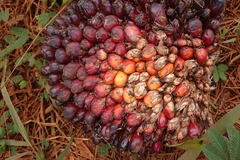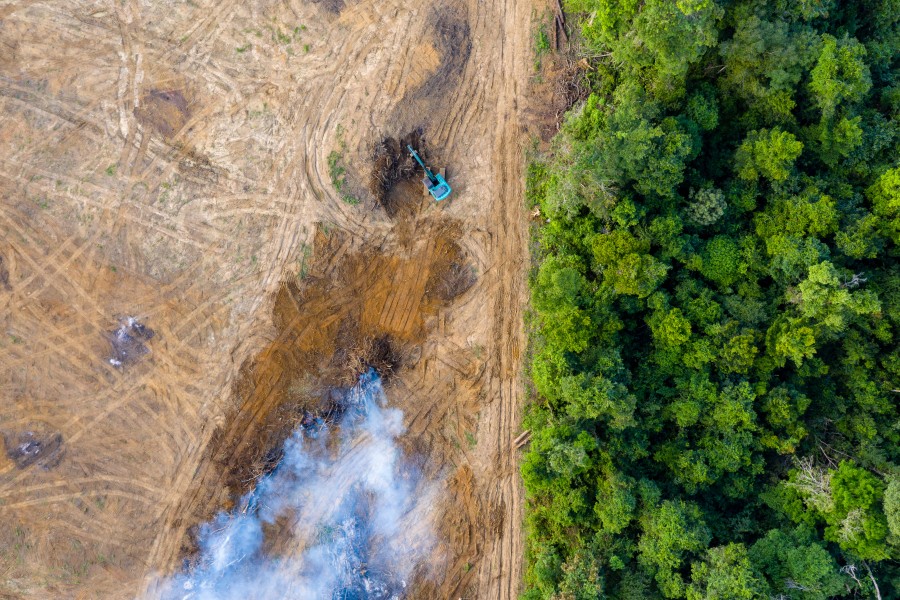
- Industry news
Industry news
- Category news
Category news
- Reports
- Key trends
- Multimedia
- Journal
- Events
- Suppliers
- Home
- Industry news
Industry news
- Category news
Category news
- Reports
- Key trends
- Multimedia
- Events
- Suppliers
Palm oil sector stalls on deforestation goals before COP30
Key takeaways
- The 2025 SPOTT assessment reveals that only half of major palm oil companies publicly monitor deforestation, exposing major transparency gaps.
- Traceability remains low — just 18% of assessed firms can fully trace supplies back to plantation origins, undermining sustainability claims.
- EUDR pressures mount as stricter EU deforestation rules highlight the sector’s slow progress toward zero deforestation and accountability.

As the food industry gears up for COP30 UN Climate Change Conference (Nov 10–11) — where themes like transforming agri-food systems through sustainable, resilient, and regenerative practices will take center stage — a new report reveals the palm oil sector is significantly off-track to meet global commitments.
One of the key findings from the latest SPOTT assessment (an annual assessment developed by the Zoological Society of London (ZSL), UK) is that only half of palm oil companies publicly monitor deforestation.
In fact, the assessment, which examined 100 of the top palm oil producers, processors, and traders, finds that the palm oil sector’s progress in general has stalled, with a serious lack of transparency in palm oil supply chains.
It found that only 51% of assessed companies publicly share evidence of monitoring deforestation, despite palm oil being a key driver of deforestation worldwide.
The assessment is published ahead of COP30 in Brazil, where the crucial role of forests and how to safeguard them better will be a central part of the discussions.
Zero-deforestation commitments
Over the last decade, the SPOTT assessments have revealed a growing picture of commitments from the palm oil sector to tackle deforestation. This focus has ramped up in recent years as the EU Deforestation Regulation (EUDR) — a major new law to combat global deforestation and forest degradation linked to products sold in the EU — comes into play.
But there are still question marks over how companies will meet the stricter rules stipulated in the EUDR.
According to SPOTT, this lack of transparency around implementation means that many palm oil suppliers still cannot demonstrate to buyers and investors that their operations are not driving forest destruction, putting both buyers and global markets, as well as critical ecosystems, at risk.
 One of the key findings from the latest SPOTT assessment is that only half of palm oil companies publicly monitor deforestation.
One of the key findings from the latest SPOTT assessment is that only half of palm oil companies publicly monitor deforestation.
Slow progress
In 2017, 29 out of 50 assessed companies reported commitments to ending deforestation. Today’s assessment reveals that 54 out of 82 companies have now made these commitments.
Now, the ZSL is urging the palm oil businesses to step up, as the industry is full of “traceability gaps” that appear to show the sector is not making much progress.
The assessment finds that only 18% of companies report being able to fully trace their supplies to plantation origin, which undermines their ability to track the risk of deforestation in suppliers’ operations.
Agriculture is responsible for over 90% of global tropical deforestation, with palm oil among the biggest contributors. The major palm oil companies, which control the majority of global volumes, are pivotal, as their policies and practices set the standard for the sector.
“Up to 40% of supermarket products contain palm oil, meaning this ingredient is part of our everyday lives, yet unsustainable practices put everyone at risk. By supporting sustainable palm oil production and instead protecting the world’s forests, investors and consumers alike are helping create a more secure future,” says Imogen Fanning, sustainable business advisor at ZSL, who led the assessment.
“Protecting our planet’s tropical forests is about securing a future that benefits people, businesses, and wildlife alike. We’re all interconnected. Palm oil plantations need stable climates to grow, but the unsustainable loss of carbon-storing trees and peatlands accelerates climate change and drives more extreme weather — putting the entire industry at risk, eroding supply-chain resilience, undermining livelihoods, and threatening food security.”
Certification initiatives improve transparency
One of the key ways companies and brands can demonstrate their commitment to combating deforestation is by signing up for globally recognized certification programs, such as the Roundtable on Sustainable Palm Oil (RSPO) trademark.
Meanwhile, consumers can use the PalmOil Scan App to identify if a product contains RSPO Certified Sustainable Palm Oil.
“Our goal is to support suppliers and buyers to create a sustainable future for both their businesses and the planet. That future depends on resilient supply chains that protect the people and wildlife that underpin them — and that all begins with greater transparency around company practices, giving buyers and investors the insight they need to make responsible, informed decisions,” adds Fanning.
Earlier this year, a Wageningen University & Research, Netherlands, study pointed out that despite its links to deforestation and GHG emissions, palm oil significantly outperforms soybean and rapeseed oils across critical sustainability metrics such as efficiency and economic impact.












